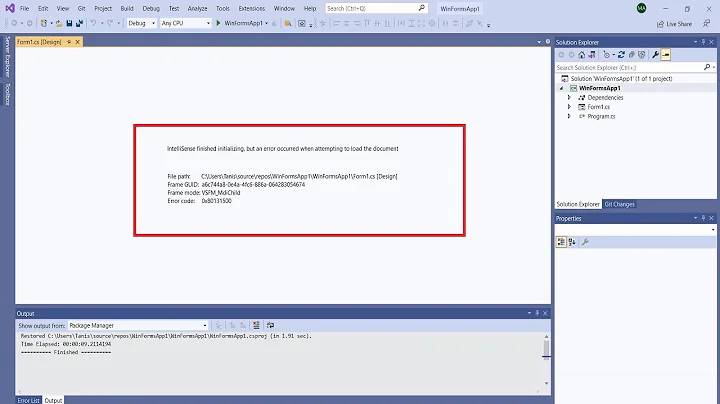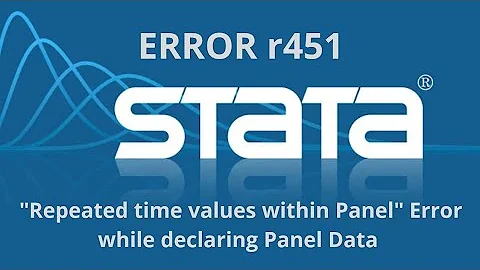What does the "declare a static final serialVersionUID" warning mean and how to fix?
Solution 1
This is explained fairly well here:
The serialVersionUID is a universal version identifier for a Serializable class. Deserialization uses this number to ensure that a loaded class corresponds exactly to a serialized object. If no match is found, then an InvalidClassException is thrown.
You fix the error by adding
private static final long serialVersionUID = 7526472295622776147L; // unique id
to the class.
Further reading:
- java.io.Serializable
- Why should I bother about serialVersionUID? (stackoverflow)
A side note: If you're using Eclipse and if you (and no one else) ever plan to serialize your classes, you can also suppress the error by going to
Window → Preferences → Java → Compiler → Errors/Warnings
and select "Ignore" on "Serializable Class without serialVersionUID".
Solution 2
just add
private static final long serialVersionUID = 1L;//or some long
Docs describe it pretty well
The serialization runtime associates with each serializable class a version number, called a serialVersionUID, which is used during deserialization to verify that the sender and receiver of a serialized object have loaded classes for that object that are compatible with respect to serialization. If the receiver has loaded a class for the object that has a different serialVersionUID than that of the corresponding sender's class, then deserialization will result in an InvalidClassException. A serializable class can declare its own serialVersionUID explicitly by declaring a field named "serialVersionUID" that must be static, final, and of type long:
ANY-ACCESS-MODIFIER static final long serialVersionUID = 42L;If a serializable class does not explicitly declare a serialVersionUID, then the serialization runtime will calculate a default serialVersionUID value for that class based on various aspects of the class, as described in the Java(TM) Object Serialization Specification. However, it is strongly recommended that all serializable classes explicitly declare serialVersionUID values, since the default serialVersionUID computation is highly sensitive to class details that may vary depending on compiler implementations, and can thus result in unexpected InvalidClassExceptions during deserialization. Therefore, to guarantee a consistent serialVersionUID value across different java compiler implementations, a serializable class must declare an explicit serialVersionUID value. It is also strongly advised that explicit serialVersionUID declarations use the private modifier where possible, since such declarations apply only to the immediately declaring class--serialVersionUID fields are not useful as inherited members.
Also See
Solution 3
Declare it like that:
private static final long serialVersionUID = -4673040337179571462L;
Its required by serializable interface.
Related videos on Youtube
user496949
Updated on December 20, 2020Comments
-
user496949 over 3 years
Possible Duplicate:
What does it mean: The serializable class does not declare a static final serialVersionUID field?Java compiler warning:
The serializable class [*****] does not declare a static final serialVersionUID field of type long.Why? How to fix it?
-
user496949 about 13 yearsHow do you generate 7526472295622776147L?
-
user496949 about 13 yearsHow do you generate -4673040337179571462L
-
 aioobe about 13 yearsYou just pick a random (unique) long value. In eclipse you could do Source Cleanup...->Custome Profile->Missing Code->Add serial version ID
aioobe about 13 yearsYou just pick a random (unique) long value. In eclipse you could do Source Cleanup...->Custome Profile->Missing Code->Add serial version ID -
Brian Lacy over 12 yearsThanks aioobe, that last bit was what I needed to know.
-
 Pablo Chvx almost 11 yearsaioobe, no explicitly assinging a serialVersionUID in my serializables can cause the application to randomly generated one after each compilation?
Pablo Chvx almost 11 yearsaioobe, no explicitly assinging a serialVersionUID in my serializables can cause the application to randomly generated one after each compilation?










![Valve Source Code 2013 Tutorial (Episode 12): Fixing VGUI Screens [Fixing Functionality]](https://i.ytimg.com/vi/3WXgSddQoCQ/hqdefault.jpg?sqp=-oaymwEcCOADEI4CSFXyq4qpAw4IARUAAIhCGAFwAcABBg==&rs=AOn4CLD5cYUyjvDCJ40HlkFtLSSbiA919A)



